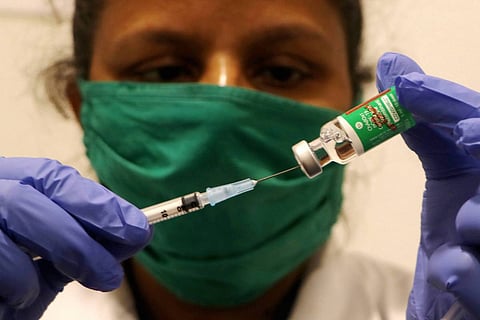

The World Health Organisation (WHO) has rejected the Pune-based Serum Institute of India's proposal seeking extension of the shelf life of its COVID-19 vaccine, Covishield, from six to nine months. According to sources, WHO rejected the proposal citing insufficient data. Shelf life is the length of time for which the item remains fit for use or effective. Developed by Oxford University and Swedish-British pharma major AstraZeneca, Covishield is being manufactured by SII.
The WHO has also sought a meeting with the Drugs Controller General of India (DCGI) to discuss the matter, they said. In a recent communique to the Pune-based Serum Institute of India (SII), the WHO has also asked the firm to formulate the doses with enough titer. The move comes even as India's drug regulator has extended Covishield's shelf life from six to nine months from its manufacturing date.
The DCGI, in a letter to SII in February, said it has no objection in respect of 'extension of shelf life of Covishield vaccine' in a multi-dose glass vial (10 dose-5ml) from six months to nine months. "You are permitted to apply the shelf life of nine months to unlabelled vials available on hand, subject to the condition that the details of such stock, batch-wise, shall be submitted to this office and Central Drugs Laboratory, Kasauli," DCGI Dr V G Somani had said in the letter. The DCGI's decision will help health authorities in reducing vaccine wastage.
According to an update by the United Kingdom drug regulator dated February 22, the shelf-life of the AstraZeneca COVID-19 vaccine is six months.
Meanwhile, concerns have been raised about the vaccine as the European Union's health agency concluded a "possible link" between the vaccine and rare blood clots but stressed that the benefits of the vaccine to protect against COVID-19 continue to outweigh the risks. The UK's medicines regulator on Wednesday said that beneficiaries in the country, who are under 30 years old, will be offered an alternative to the Oxford-AstraZeneca vaccine due to "evolving evidence" linking it to rare blood clots.
Meanwhile, COVAX Facility, a global initiative for equitable access to COVID-19 vaccines, has notified all participating countries that the supply of the vaccine produced by SII will face delays in March and April in view of the surge in COVID-19 cases in India. However, AstraZeneca sent a legal notice to its manufacturing partner, SII, over the delay.